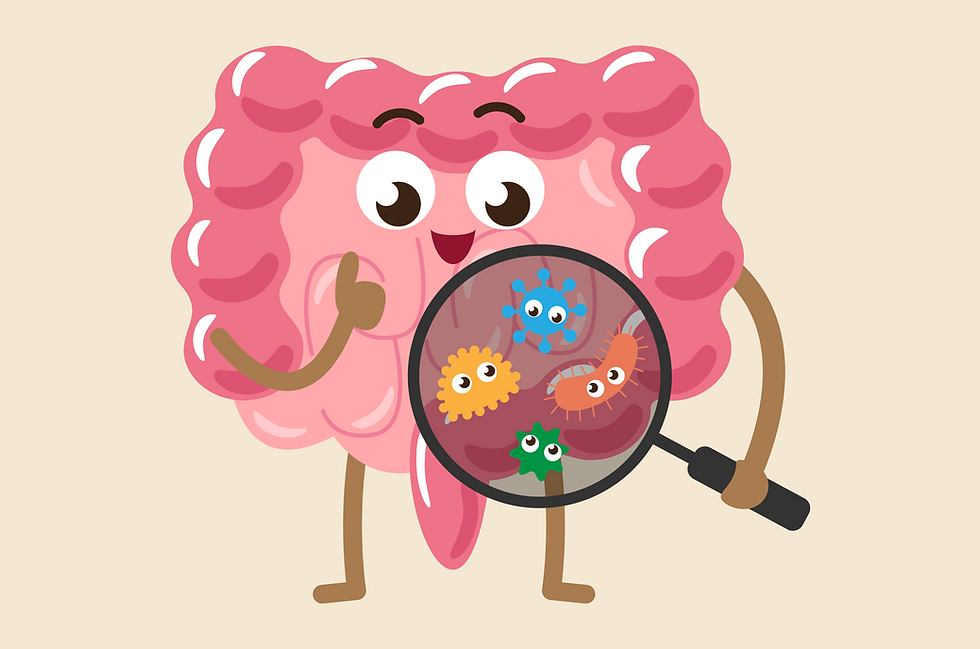All About Prebiotics: The Secret to a Healthy Gut
- Avanti Deshpande

- Nov 6, 2024
- 2 min read
Updated: Aug 25, 2025

In today’s world, we are constantly bombarded with products and medications claiming to “heal the gut.” But the truth is, your gut already has trillions of microorganisms — good and bad — that determine your overall health. When the balance tips toward the harmful bacteria, gut health suffers. That’s where prebiotics and probiotics come into play.
While probiotics are already a trending superfood, prebiotics are equally important. Think of them as the food for probiotics — the beneficial bacteria that thrive in your gut. By nourishing these microbes, prebiotics support a healthy gut, better digestion, stronger immunity, and even improved metabolism.
🔍 What Are Prebiotics?
Prebiotics are non-digestible carbohydrates (oligosaccharides) that selectively promote the growth of beneficial bacteria in the gut. When fermented by intestinal microbiota, they produce short-chain fatty acids (SCFAs) like acetate, lactate, and butyrate, which have powerful anti-inflammatory properties.
Types of prebiotics include:
Fructo-oligosaccharides (FOS) → contain inulin, feed healthy bacteria.
Galacto-oligosaccharides (GOS) → support Bifidobacteria and Lactobacillus growth.
Resistant starch → improves digestion and metabolism.
Unlike many nutrients, prebiotics and probiotics are resistant to stomach acid, which means they survive digestion and reach the intestines where they work best.
🌿 Benefits of Prebiotics for Gut Health
Prebiotics play a vital role in maintaining a balanced gut microbiome and offer numerous health benefits:
✅ Promote growth of good bacteria like Lactobacillus & Bifidobacterium
✅ Support regular bowel movements and relieve constipation
✅ Reduce gut pH & inflammation
✅ Improve blood glucose & cholesterol control
✅ Enhance absorption of calcium & magnesium
✅ Defend against harmful pathogens
✅ Reduce the risk of colon cancer
✅ Boost immunity and improve metabolism
✅ Manage digestive issues like IBS, diarrhea, and bloating
🍎 Natural Sources of Prebiotics
Prebiotics are naturally present in many fiber-rich foods such as:
Fruits: Apples, bananas, berries, tomatoes
Vegetables: Asparagus, artichokes, chicory root, onions, garlic, leeks, dandelion greens
Whole grains: Oats, wheat bran, barley
Legumes: Chickpeas, peas, beans, lentils, soybeans
Seeds: Flaxseeds
Cocoa and plant-based fibers
🥗 Prebiotics and Fiber: A Strong Connection
Since prebiotics are closely linked with dietary fiber, they are classified into two types:
Soluble Fiber: Dissolves in water, fermented by gut bacteria. Found in oats, legumes, apples, and seaweeds. Improves digestion and blood sugar levels.
Insoluble Fiber: Adds bulk to stool, supports bowel movement. Found in whole grains and vegetables.
📏 Recommended Intake of Prebiotics
To keep your gut microbiome healthy:
Aim for 25–38 grams of fiber daily (adults).
Include at least 5 grams of prebiotics either from natural sources or supplements.
Combine prebiotics and probiotics in your diet for a balanced gut ecosystem.
🌟 Final Thoughts
Your gut health is directly linked to your overall well-being — from immunity to digestion, metabolism, and even mental health. Including prebiotics in your diet ensures that the good bacteria in your gut stay nourished and active.
By eating more whole grains, legumes, fruits, and vegetables, you not only improve digestion but also build a stronger foundation for long-term health. So the next time you focus on probiotics, don’t forget — prebiotics are just as important!





Comments